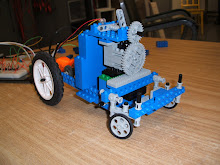I don't really feel that way, but when you are married to Kelly it is not uncommon to find Rod Stewart lyrics running through one's head. In this year of milestones and changes, it occurred to me that this is the first autumn since 1974 when I haven't been in school.
I am still adjusting to this. I have set my internal clock to the academic calendar for so long that it is hard to think in terms of "fiscal quarters" instead of semesters... as if one was any less arbitrary than the other.
It is good to have stepped away from the classroom. I had reached a stagnation point in improving as a teacher. What I wanted to do was to help students learn to figure things out for themselves, to see connections and to grasp fundamental concepts in a way that they would retain and apply rather than forget. The challenge of a classroom is that every student responds differently to the same process. By the end, I was staring too much at the students who didn't respond well to my style and was becoming frustrated at my inability to adapt myself.
Now I am trying to learn as frantically as possible. It is interesting to assess how much of my formal knowledge I use. I would say that a majority of the time, I am trained monkey. Do this, push that button, write down the result, fill out this form, blah, blah, blah. A good fraction of the time I am utilizing only the basic concepts of my education, but combining those with problem solving skills and a willingness to dive in and learn the particulars of a given problem. Only a tiny percentage of the time do I feel like a specialized piece of information comes in handy, but when it does it can feel like the key in the lock that makes everything move.
Kelly is taking two online classes right now, and I am intrigued by the concept. I think there is a lot of potential in the format. The learning relies very heavily on her ability to read the material, process it and figure out how to apply it. It is very labor intensive, if a student wasn't as self-motivated as Kelly it would go very poorly. I think with some tweaking, it could be a very effective format. The challenge with the current online framework is that if a topic is confusing to the student, it can be a complete roadblock since the resources to get clarification are not as prevalent.
I learned an interesting thing about teaching while watching a Nature special on PBS. Apparently humans are the only ones of the great apes who teach. Chimpanzees, gorillas and orangutans are fully capable of learning by observation; but they don't actively work to instruct others. The show called it the "teaching triangle". If I point my finger at something, your eyes follow to the object. We create the triangle between the teacher, the pupil and the object. If a trainer with a gorilla points at an object, the gorilla stares at the finger of the trainer. (Commenter challenge: be the first to associate this fact with a scene from a movie. I am thinking of one in particular)
This has led to a summer of brushing up my biology. Despite having a fantastic biology teacher in high school (Hi, Mom!), my understanding of the boundary between evolutionary biology and anthropology feels weak. Perhaps the textbooks gloss over such things in a vain effort to not offend the nutjobs, or perhaps the knowledge is more recent than my biology class twenty years ago.
Given that chimpanzees share 99% of our DNA and are capable of learning, language, problem solving, play, cruelty, mathematics and personality, what does it mean to be human. What change was the crucial difference that led us down this path. After reading Jared Diamond's "Third Chimpanzee" and Richard Dawkins' "Selfish Gene", I keep coming back to the idea of teaching as the linchpin concept.
As Diamond points out, if an alien race arrived at the planet 100,000 years ago, humans would have been unremarkable and simply classified as a type of chimpanzee. He goes on to talk about some of the notable differences and similarities between ourselves and our primate cousins, but doesn't really speculate on what caused such notable shifts. Dawkins does a good job of explaining how a small genetic change can have large repercussions by reappropriating existing genes to new purposes.
It seems like the desire to teach is good candidate for the tipping point. Once humans began to teach our young rather than expect them to learn by imitation, evolutionary pressure in favor of richer language and cultural development grows. With language and culture come evolutionary pressures for extended childhood, menopause and the other human oddities.
I have no idea if I am even potentially close to correct, but it is fun to think about things outside of my usual subjects. Is it too late to go back for a PhD in anthro-evolution?
Sunday, September 21, 2008
Subscribe to:
Comments (Atom)


